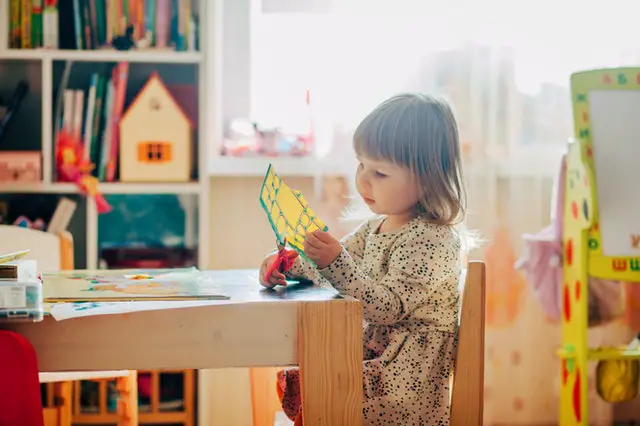How Many Hours Should A 4-Year-Old Study?
Do you have a tough time teaching your 4-year-old child?
Are you looking for useful tips for getting your 4-year-old child to study?
Preschoolers often find studying and learning boring and unimportant because they are at a stage where they just want to play all day. But to put them on track, parents’ help and continuous assistance can make them good learners.
A 4-year-old child can soak a lot of information daily, so it is your job to encourage them to develop self-studying habits and a positive learning attitude that will help them in the long run.
How many hours should a 4-year-old study?
Generally, the average attention span (for one type of activity) of a 4-year-old is 8-12 minutes, but it can be extended by making studies more interesting and fun.
In order to introduce a new concept, homework completion should be done in nearly 60-90 minutes because this is the maximum you can stretch.
But most importantly, ensure to improve the quality of time the child spends during the study. Instead of counting the minutes, you should count what your little one has learned.
What is more important than hours is to build the habit of self-studying. To create a self-study habit, we as parents should stop counting the hours and focus on the grades. Instead, we need to focus on what they have learned every day. So at this age, emphasize positive learning experiences.
What is the best time for a 4-year-old to study?
I suggest two options for the best time for a 4-year-old to study.
- First is, doing the studies right after school. When the child gets home, he should take a bath, change his uniform, have some snacks, and finish homework and learning.
- The second best option is the evening, after a nap.

This post may contain affiliate links. Read our disclosures here.
How to get a 4-year-old to study?
I understand we as parents want our children to excel in every subject and perform well in studies, but it sometimes gets hard to make a 4-year-old study, so I have come up with some useful tips on how to get a 4-year-old to study.:
1- Set a routine and follow it daily
Anything done systematically shows more positive results than doing it just randomly; the same is the case with studies.
The child should have a proper routine to be a punctual individual.
Whatever routine suits you, ensure to follow it daily. By following a regular pattern of activities, your child will be mentally ready, and his attention span will be much better.
2- Create a study environment
Creating a study environment helps the child to focus on his studies easily. Get a proper study station where he can sit and do his work and learn. It is better to have a separate study area with fewer distractions, as the typical attention span of a 4-year-old is extremely low.
A good example is Melissa & Doug Wooden Lift-Top Desk & Chair. The desk height is great for 4-year-olds, and the white color will not distract the child.
3- Break down the homework and the lesson
Generally, a 4-year-old kid is a preschooler and does not have much homework or learning every day. But if you find him distracted after a few minutes of study, break down the homework into little tasks and praise him when he finishes each task.
The same goes with learning, pass the concepts into chunks so that he can understand them correctly.
4- Use a sand-timer to improve focus
Sand-timer is an excellent investment for small kids who don’t know how to see a clock. Sand timers come with different time slots. So get your hands on a sand timer to improve your child’s focus. Set the timer and ask your child to finish the task before the sand passes on the bottom of the hourglass.
hand2mind Jumbo 1, 2, 5, and 10 Minute Sand Timer Set is a great choice. If you have a little child at home, this is a must-have.

5- Sit with the child as he needs assistance
A 4-year-old child needs assistance from an elder when they do his homework or learns a lesson. The best thing to do as a parent is to sit with your child and assist him from time to time while making him independent with the reinforcement work. Meanwhile, the parents should fully involve and refrain from using a phone or a laptop.
6- Try to accept his way of learning
Most of us agree that when it comes to studies, we have been controlled and pressured to do the tasks the same way our teachers and parents wanted them to be. Some kids feel frustrated when all they experience is Control.
Every child has his way of learning. Therefore, it’s important to allow him to control his learning experience. For example, allow the child to draw whatever he likes in an art project or choose his favorite animal to write some lines about it.
7- Explain concepts in a fun and creative way
You can make the study time fun by explaining the concepts in fun and creative ways.
For example, show him relevant poems like “What animal says what” for animal sounds, “What does the alphabet say” for Alphabet sounds, or “Ten in the bed” for backward counting.
This way, the child will enjoy the study time, and the concepts will be more straightforward in his head.
8- Use a whiteboard and markers for learning
Whiteboard is a blessing when it comes to memorizing something. It is more convenient than erasing on a notebook. Get colorful board markers to make learning fun. Encourage your child to pronounce the word in his head and make spellings.
Writing on the whiteboard not only makes the child confident but also helps memorize the lesson more easily,
9- Compliment him every now and then
Who does not like being complimented now and then? So make it a habit of appreciating your kid even on the minor achievements like good handwriting, correct spelling, good coloring, etc. an acknowledged kid not only feels good about it but also gets motivation from it.
10- Give them a chance to participate while studying
To keep the child involved in the studies, allow them to participate as much as possible. Listen to their ideas, concepts, and ways to learn anything. The more kids feel involved in their studies, the more they focus and enjoy it.
Besides giving them a chance to participate, ask them to express their feelings.
11- Introduce reading habit to make his life easy
You must have heard that “Readers are the future Leaders,” and there is no doubt about it. The children who love to read are usually good at studies too. So it is vital to inbuild a reading habit in your child.
Reading sharpens the mind and helps the child learn the sight word quickly. Built a mini library in his room and reinforce bedtime reading in your child.

12- Give breaks in between
If your child loses interest in studies after some time, allow him to have short breaks to do what he likes. Having short breaks helps regain the energy and interest lost. You can easily spot the difference in attitude and willingness to study after a short break.
13- Recount his achievements
Always remember his achievement and recall it when you see your child needs it. No matter how small the achievements could be but it is important to recognize past accomplishments and celebrate the new ones. This gives a child constant reinforcement to motivate them positively.
14- Study time means study time
Besides dull days, make your child understand that study time means study time and nothing else. It does not mean you manipulate or lecture your child but create a perfect balance between studies and other stuff.
Make him understand that when you play on your playing time, take breakfast on time, and sleep at the specified time, studies should also be done at the decided time every day.
15- Lastly, focus on learning, not grades.
As parents, it is our habit to ask children what they did on the test as soon as they reach home. But, have we ever asked them what they have learned new today? We are more focused on grades than learning. Performance is important, but learning outcomes are more long-term and solid.
Summary:
How many hours should a 4-year-old study? A 4-year-old should study between 30-90 minutes after school. This time span varies from child to child as some kids show more interest in studying than others.
I suggest focusing on learning instead of time. Check what your little one has accomplished in the time he has been holding his pencil and books.
As a parent, it is your duty to provide him with a good study environment, good equipment, and lots of help.
I suggest getting a set of sand timers that will help a lot.









